Key takeaways:
- Recognizing personal triggers helps in managing feelings of inadequacy caused by societal pressures.
- Developing coping strategies like journaling and mindfulness practices significantly aids in navigating societal expectations.
- Building a supportive network fosters connection and understanding, alleviating feelings of isolation.
- Setting personal boundaries is essential for prioritizing mental health and honoring individual needs.
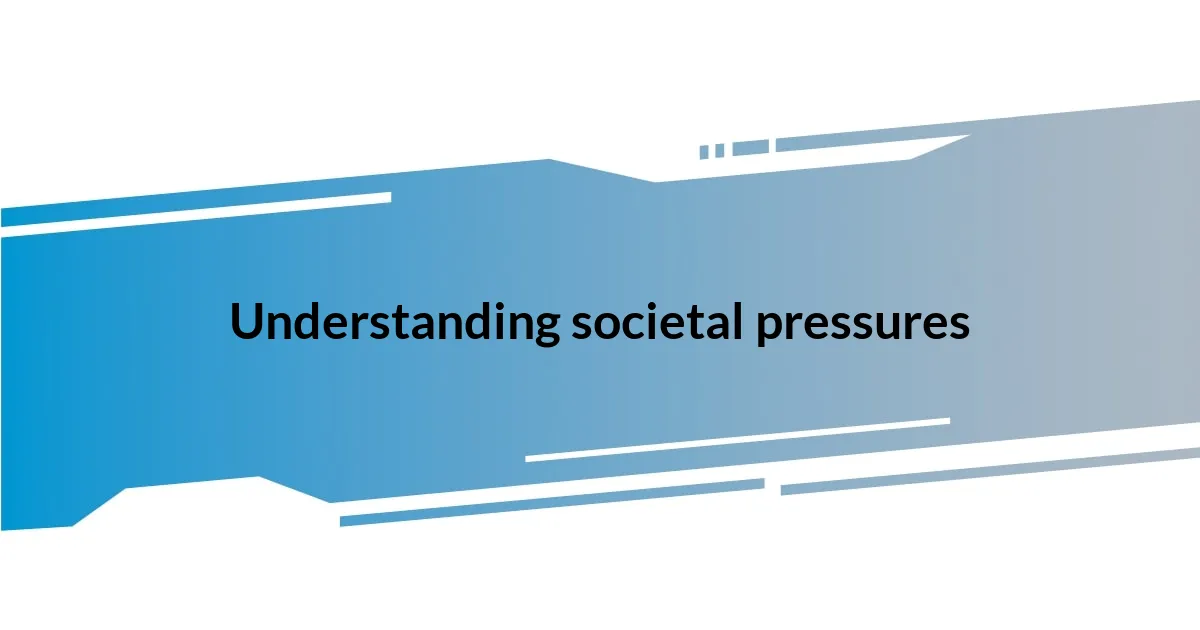
Understanding societal pressures
Societal pressures can often feel like an invisible weight on our shoulders, pushing us to conform to expectations that sometimes don’t align with who we truly are. I remember a time when I felt this burden acutely while choosing my career path; everyone around me seemed to have their lives figured out, but I was still searching for my passion. It made me question: Why do we let others define our success?
As I navigated those feelings, I began to understand that societal pressures are shaped by cultural norms, media influences, and even our social circles. Each interaction can serve as a reminder of what society deems “normal” or “acceptable.” I often wonder, what do we lose when we prioritize these external validations over our authentic selves? For me, it took time to realize that embracing my true identity was far more rewarding than chasing fleeting social approval.
There’s also this pervasive idea that we must fit into certain molds, be it in fashion, career, or lifestyle choices. I distinctly recall feeling out of place at social gatherings where everyone seemed to share the same interests. This led to a sense of isolation, making me question my choices even more. Isn’t it peculiar how we sometimes feel disconnected when we don’t mirror the expectations around us? Understanding these pressures has been a journey, prompting me to reflect on the influence they have on my life and how I can navigate them in a way that honors my individuality.
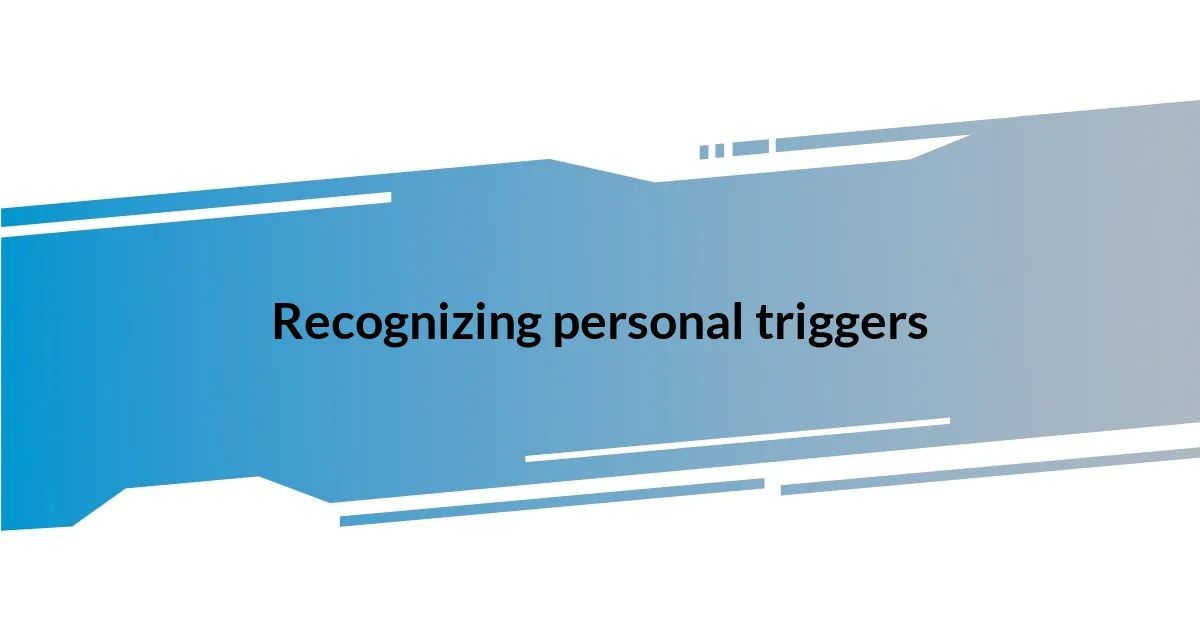
Recognizing personal triggers
Recognizing my personal triggers has been a pivotal part of my journey in coping with societal pressures. I recall a moment when a friend’s casual comment about my weight made me hyper-aware of my appearance. Suddenly, I found myself spiraling into negative thoughts, feeling the pressure to conform to a specific body image that society often glamorizes. The experience taught me that certain situations or remarks can ignite feelings of inadequacy, pushing me to evaluate what truly bothers me.
To navigate these triggers, I’ve found it helpful to identify specific scenarios that evoke strong emotions. Here are some triggers I’ve recognized in my own life:
- Comparing myself to curated social media content, which can amplify feelings of inadequacy.
- Certain gatherings where discussions revolve around achievements, leading me to question my own journey.
- Criticism, even if it’s well-intended, can trigger self-doubt and anxiety.
- Fashion trends that make me feel out of touch with what’s considered “in.”
By being aware of these triggers, I can actively manage my reactions and make more conscious choices that align with my true self.
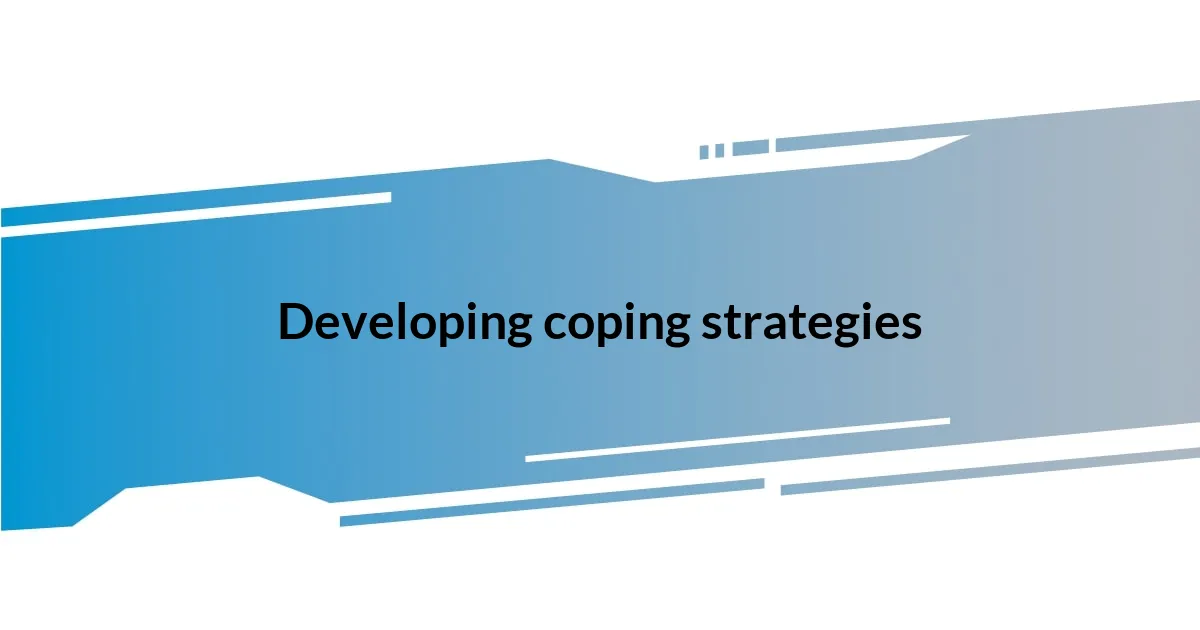
Developing coping strategies
Developing coping strategies has been a transformative aspect of managing the pressures society places on us. I often turn to journaling as a way to disentangle my thoughts. When I put pen to paper, I feel an immediate release, almost like lifting a weight off my chest. This practice not only helps me reflect on my feelings but also allows me to outline strategies that work for me, such as taking breaks from social media when the curated perfection becomes overwhelming.
Engaging in mindfulness practices, like meditation, has also greatly shaped my coping mechanisms. The first time I tried meditating, I was surprised by how my racing thoughts calmed down. I could focus on my breath and let go of the incessant self-criticism fueled by societal expectations. It was eye-opening to realize that just a few minutes of quiet reflection could ground me and create a mental buffer against external pressures.
Additionally, surrounding myself with supportive friends has proven essential. I remember a heartfelt conversation with a close friend, where we both admitted to feeling the weight of societal expectations. Sharing our vulnerabilities fostered a safe space where we could be authentically ourselves, free from judgment. This connection not only lightened our emotional loads but also reinforced the idea that we’re not alone in our struggles.
| Coping Strategy | Description |
|---|---|
| Journaling | A way to express and reflect on thoughts, helping to clarify feelings and develop personal strategies. |
| Mindfulness | Practices like meditation that promote relaxation and help manage negative thoughts influenced by societal pressures. |
| Supportive Friendships | Building relationships where vulnerability is welcomed, creating a network of understanding and acceptance. |
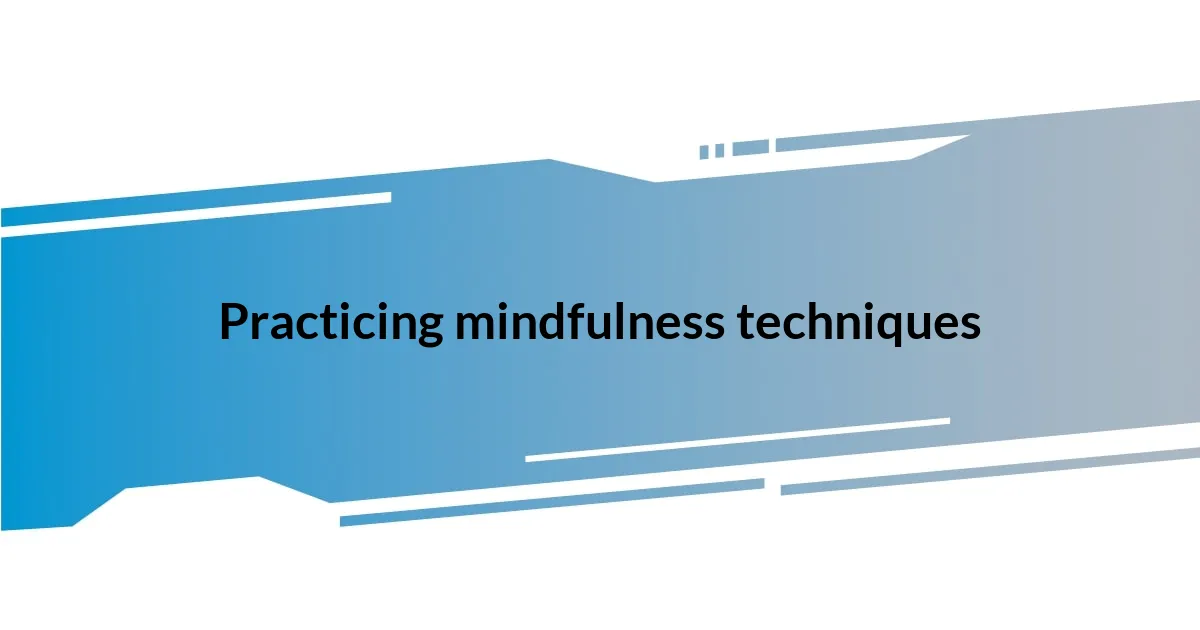
Practicing mindfulness techniques
Practicing mindfulness techniques has been a game changer for me in managing societal pressures. One afternoon, I decided to take a brisk walk in nature, allowing my surroundings to pull me into the present moment. With each step, I focused on the sound of leaves crunching underfoot and the cool breeze against my skin. This simple act reminded me that the outside world often quiets the noise within, if only for a moment. Isn’t it fascinating how such small practices can ground us?
Meditation, in particular, has been pivotal. I can vividly remember my first session—I sat cross-legged, feeling restless and distracted, but gradually became aware of the stillness that enveloped me. The moment I acknowledged my racing thoughts without judgment, I realized how often I carried the weight of others’ expectations. It was enlightening to think, “Why do their opinions matter so much?” This practice of self-reflection helped me cultivate a sense of acceptance toward myself.
Breathing exercises are another mindfulness technique I’ve embraced. When I feel overwhelmed, I practice the 4-7-8 technique: inhaling for four seconds, holding for seven, and exhaling for eight. I often use this before facing situations that induce anxiety, like social gatherings. It’s amazing how just a few minutes of conscious breathing can clear the mental fog and empower me to engage more authentically. Every time I do this, I realize I have the tools to reclaim my peace, even in a world that often feels chaotic. How powerful is that?
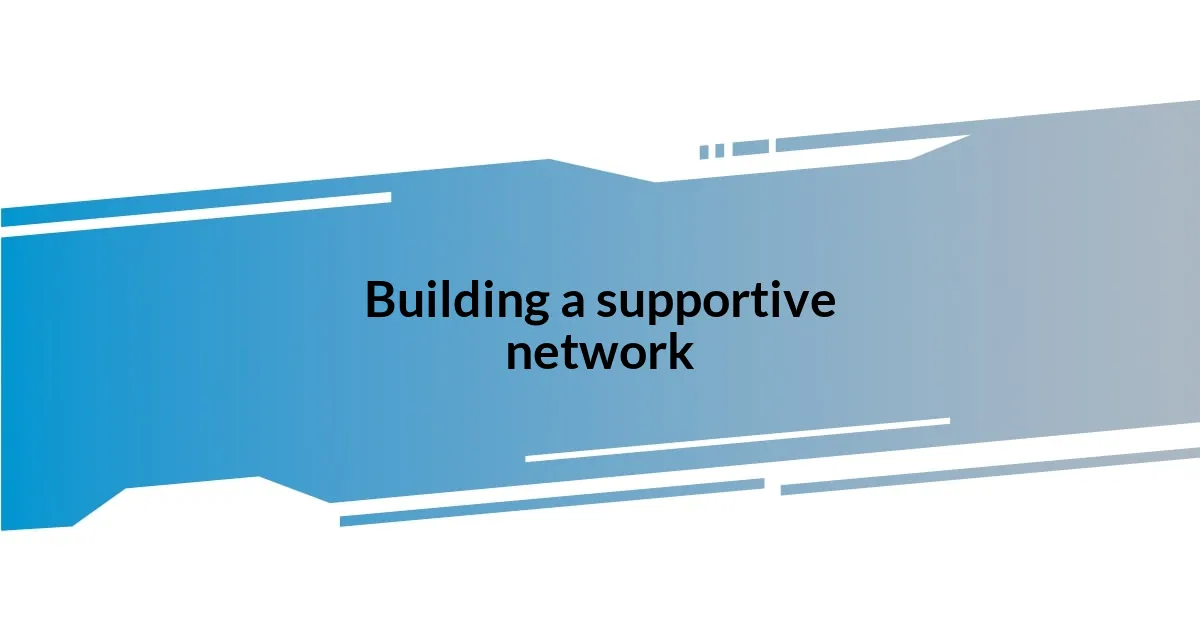
Building a supportive network
Building a supportive network is something I’ve found to be crucial in navigating societal pressures. I remember when I decided to reach out to a group of like-minded individuals who also grappled with similar expectations. The initial meet-up was filled with laughter and empathy, and it was so refreshing to voice my concerns without fear of judgment. Can you imagine how liberating it feels to share your struggles with people who truly understand?
I’ve also learned the value of being intentional about who I surround myself with. A few months back, I distanced myself from relationships that felt more draining than uplifting. It was tough at first, but I soon realized that creating space for supportive connections nurtured my emotional wellbeing. As I engaged with positive influences, I began to notice a shift in my mindset. Isn’t it remarkable how the right circle can inspire you to feel more confident in your own skin?
Finally, I often encourage my friends to establish their own support networks, knowing firsthand how it can ease feelings of isolation. I remember suggesting to a colleague to join a community group focused on shared interests. Watching her flourish and connect with others was heartwarming. It reminded me that we all thrive on connection—how can we face societal pressures alone when we’re meant to uplift each other?
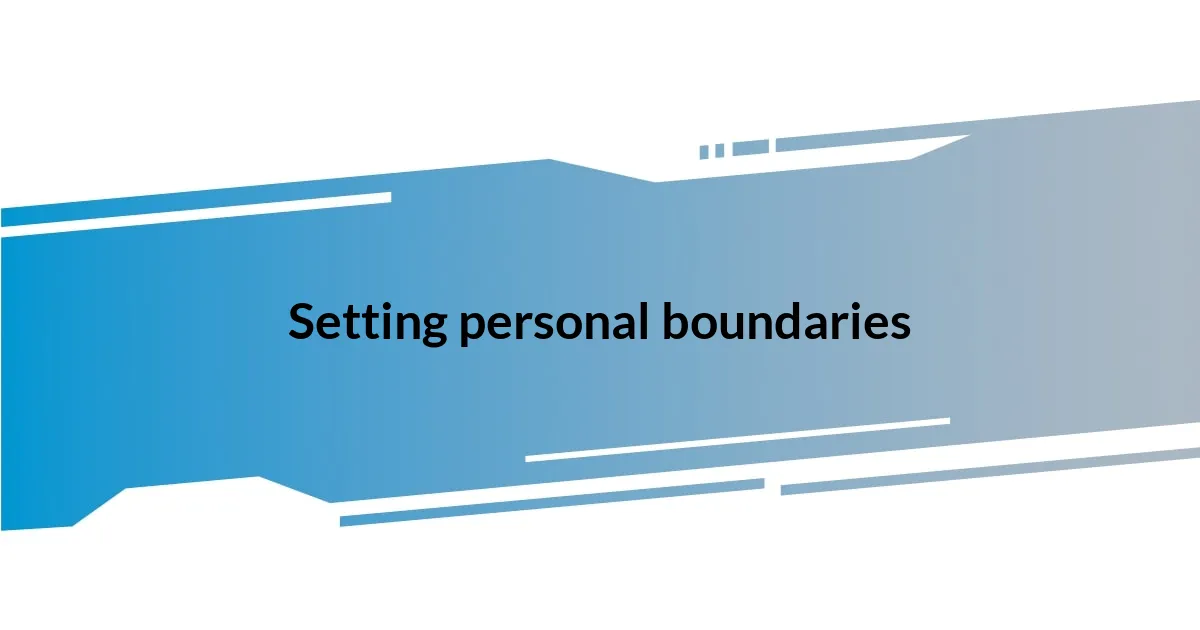
Setting personal boundaries
Setting personal boundaries has been a transformative aspect of my journey in dealing with societal pressures. I remember a time when I felt compelled to attend every social event, fearing missing out or disappointing someone. However, I reached a point where I realized that saying ‘no’ is not just about declining an invitation; it’s about honoring my own needs and energy levels. Have you ever felt just as drained by the thought of an obligation as by the event itself?
Establishing these boundaries required a bit of trial and error. For instance, I once set a personal limit of attending only one gathering per weekend. At first, it felt foreign and even selfish, but I quickly learned the importance of carving out time for solitude and reflection. When I finally attended gatherings, I found myself more present and engaged. Isn’t it interesting how a little time just for ourselves can recharge our spirit?
Moreover, I began communicating my boundaries with friends and family, which wasn’t always easy. I recall a heartfelt conversation with a close friend, who initially seemed disappointed when I explained my need for time alone. However, as I shared my reasons, he began to understand and even support my choice. In the end, that open dialogue not only strengthened our friendship but also reinforced my belief in prioritizing my mental health. It’s amazing what happens when we assert our needs—how has setting boundaries transformed your relationships?
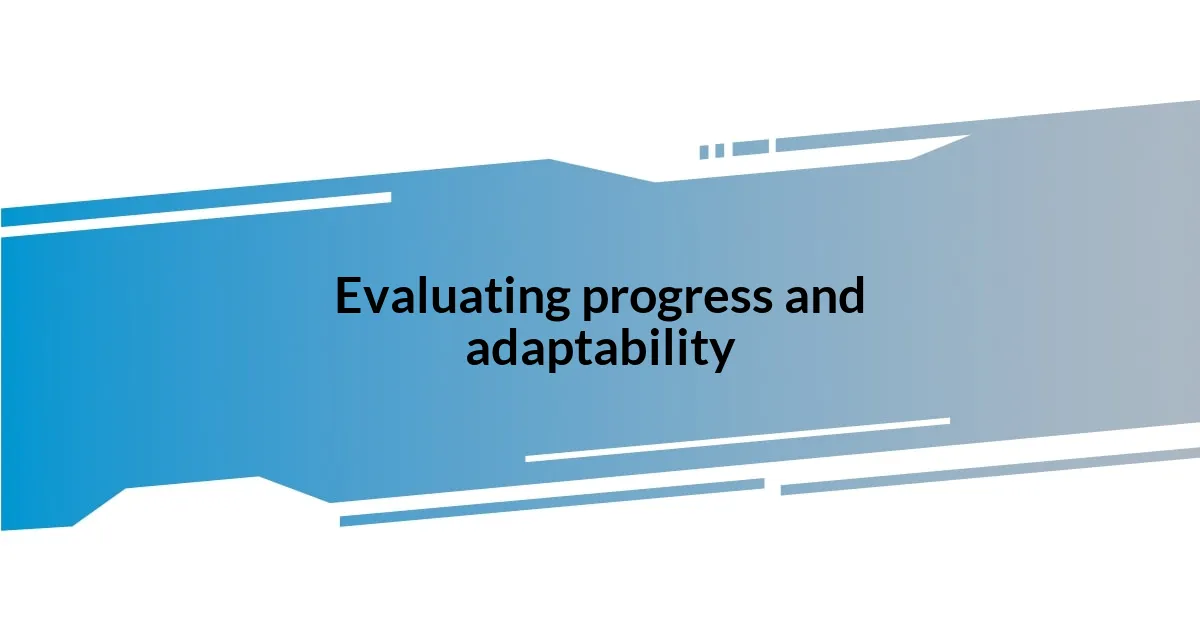
Evaluating progress and adaptability
Evaluating progress and adaptability has been an eye-opening experience for me. I remember keeping a journal where I’d jot down my feelings every week. Looking back, I could visibly see how my thoughts shifted—from feeling overwhelmed by societal demands to embracing my own pace and choices. Isn’t it incredible how documenting our journey can reveal just how far we’ve come?
One day, I stumbled upon an old entry about a time I felt entirely lost, trying to meet everyone’s expectations. It hit me hard; I was bending over backward for approval. That reflection sparked a commitment to adapt, embracing the notion that growth doesn’t follow a straight path. Each setback taught me resilience. I found myself asking: how adaptable am I willing to be in pursuit of my own happiness?
This practice of evaluating myself made it clear that adaptability is not merely about changing circumstances but also about nurturing self-awareness. I started celebrating even the small wins—like choosing to step back when I felt overwhelmed. There was a palpable shift in my mindset, transforming challenges into learning opportunities. How often do we celebrate our adaptability instead of just focusing on our shortcomings?